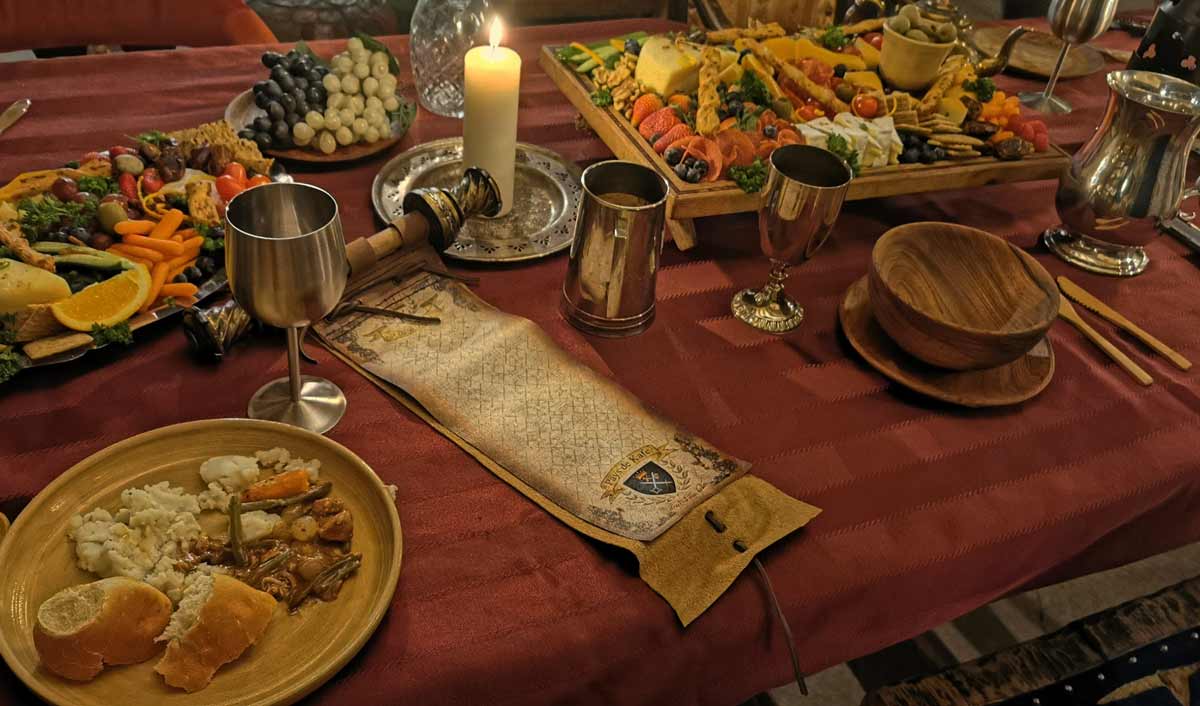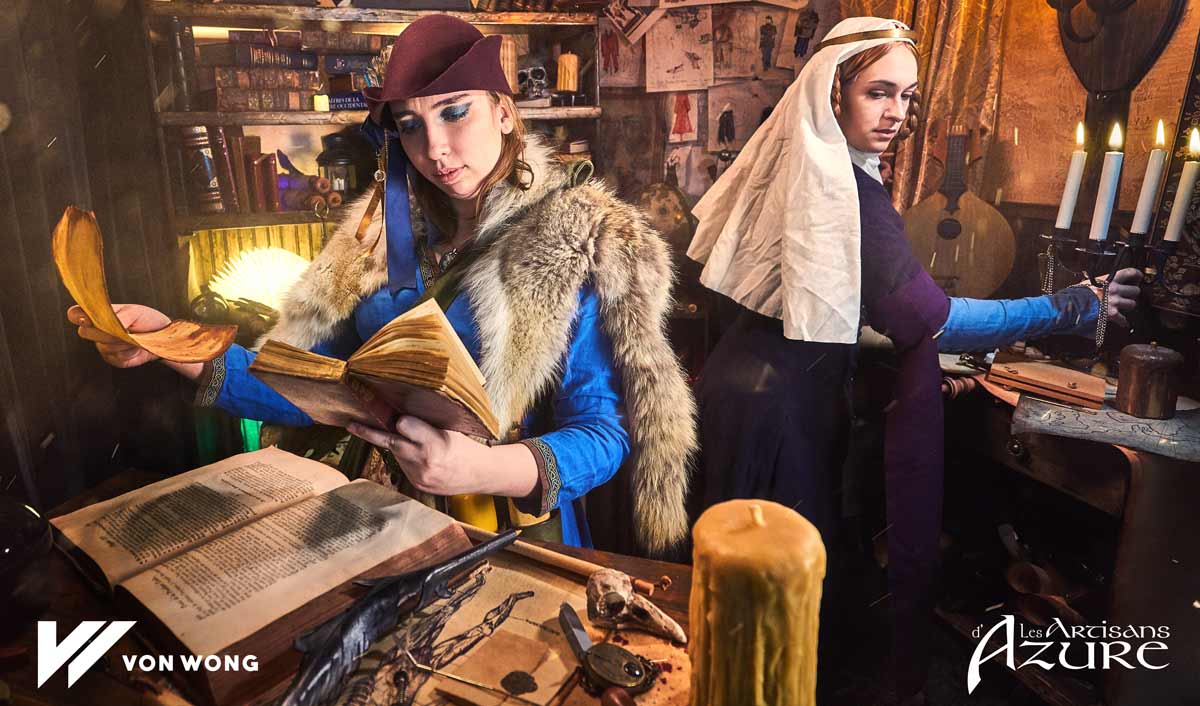For many, LARP (Live Action Role Playing) conjures up images of warriors clashing steel, wizards casting spells, and archers raining down arrows. While combat is certainly a thrilling aspect of LARP, it's not the only path to an engaging and rewarding experience. There's a whole world of non-combat roles waiting to be explored, offering unique opportunities for character development, strategic thinking, and immersive storytelling.
Whether you're new to LARPing or a seasoned veteran looking for a fresh perspective, non-combat roles can unlock new layers of enjoyment. This article will serve as your guide, providing an overview of various non-combat roles, their significance in the game, and tips to enhance your gameplay experience.
Cooks: Culinary Magic in the Fantasy Realm
Cooks play an equally important role in the game, nurturing the community and keeping its members well-fed. They are more than just chefs; they are artists, social connectors, and contributors to the immersive atmosphere of the LARP world.
Beyond mere sustenance, their culinary creations nourish the soul, boosting morale and fostering a sense of community through the shared experience of enjoying delicious meals together. Cooks further contribute by adding authenticity and immersion, utilizing historically accurate recipes and cooking methods to create dishes that transport players to another time and place.
Their kitchens become hubs for social connection, providing a welcoming space for players to gather, connect, and build lasting relationships. Finally, cooks embrace the spirit of roleplaying, developing their character's backstory and personality around their culinary skills, using food as a tool for interaction, and creating unique opportunities for storytelling and character development.
It’s important to note that there isn’t a specific cooking role in LARP so it’s not required that you’re a world-class chef, but it’s definitely fun!
Tips for aspiring LARP cooks:
- Develop your culinary skills: This is the foundation of being a successful LARP cook. Learn basic cooking techniques, explore historical recipes, and experiment with different flavors and ingredients.
- Consider the setting and context: Choose recipes and cooking methods that are appropriate for the LARP's historical period and cultural background.
- Prioritize safety and hygiene: Ensure food is prepared and stored safely to avoid any health risks. Follow proper food handling and hygiene practices.
- Collaborate with others: Work with fellow cooks and players to plan menus, organize food preparation, and create a welcoming and inclusive atmosphere.

Bards and Entertainers: Weaving Tales and Music
Bards are vibrant, versatile figures who play a crucial role in enriching the game world and fostering a sense of community. They are the storytellers, musicians, singers, poets, and entertainers who bring joy, laughter, and inspiration to the realm. Bards play a multifaceted role in LARPing, enriching the game world and fostering a sense of community.
As masters of entertainment, they uplift spirits and liven up the atmosphere with music, song, and poetry, fostering joy and celebration. Additionally, bards serve as informants and advisers, utilizing their vast knowledge to provide players with valuable information about the game world, events, locations, and characters, offering guidance and support, especially to newcomers.
Finally, bards act as chroniclers of events, documenting the ongoing narrative of the LARP world through their creative expressions, immortalizing the triumphs and tragedies, heroes and villains, and the everyday lives of characters within the game. These key functions combine to make bards indispensable figures in the LARPing community.
Tips for playing a bard in LARP:
- Develop your storytelling skills: This is the most important aspect of playing a bard. Practice telling stories, writing songs and poems, and performing in front of others.
- Learn a musical instrument: Although not required, knowing how to play an instrument can greatly enhance your bardic abilities. Popular instruments in LARP include lutes, flutes, drums, merlins and bagpipes.
- Interact with other players: Bards are social creatures. Get to know other players, learn about their characters and stories, and use your talents to connect them.
Healers: The Menders of Wounds
The role of a healer in LARP is vital to the game, both in terms of gameplay and immersion. Healers provide a valuable service to other players, keeping them alive and allowing them to continue participating in the game. They also add to the atmosphere of the LARP, creating a more believable and immersive experience for everyone involved.
There are many different ways to play a healer in LARP. Some healers are primarily focused on combat, providing support to their allies by healing them during battles. Other healers are more focused on roleplaying, interacting with other players and providing them with emotional support. There is no right or wrong way to play a healer, and the best way to do it is to find a style that you enjoy and that fits well with the LARP you are playing.
Tips for playing a healer in LARP:
- Be prepared: Make sure you have all of the necessary supplies, such as bandages, herbs, and potions. You should also be familiar with the rules of the LARP, so that you know how to heal other players effectively.
- Be proactive: Don't wait for other players to come to you for healing. Be proactive and offer your services to players who are injured.
- Be patient: Healing can take time, so be patient with other players. Don't get discouraged if you can't heal everyone immediately.
- Be creative: There are many different ways to heal other players. Be creative and come up with your own unique methods.
Crafters and Artisans: Shaping the In-Game World
Crafters and artisans play a vital role in LARP, contributing to the game in several important ways. They can (fictitiously) create the objects that make the LARP world come alive, including weapons, armor, clothing, jewelry, and furniture. Their work helps to immerse players in the setting and create a more believable and enjoyable experience.
Crafters and artisans also support the LARP economy by producing the goods and services that players need. They create custom items for players, helping them develop their characters and identities. Luckily in a LARP, you just roleplay blacksmithing or housebuilding. Crafters aren’t expected to create real weapons and armor in the game. However, crafters are also encouraged to bring any skill they have outside of LARP into the game such as embroidery or woodcarving.
Tips for becoming a crafter or artisan in LARP:
- Start small: Don't try to tackle too much at once. Start by learning one or two basic skills, and then gradually expand your repertoire.
- Find a mentor: Some experienced crafters and artisans are willing to share their knowledge and skills. Find a mentor who can teach you the ropes and answer your questions.
- Practice regularly: The more you practice, the better you will become. Set aside time each week to work on your craft.
Scholars: Keepers of Knowledge and Mysteries
Scholars and chroniclers play a crucial role in preserving knowledge, sharing stories, and adding depth and intrigue to the LARP world. They are the historians, librarians, and loremasters who keep the past alive and inspire future generations. In the bustling world of LARPing, scholars and chroniclers play a vital role in preserving the past and shaping the future.
They meticulously research and record the history, culture, and traditions of the game, ensuring that this knowledge is passed down through generations in books and scrolls. But their endeavors extend far beyond simple archiving. Skilled storytellers weave new narratives into the existing story, enriching the LARP world and captivating players with their imaginative creations.
Their expertise extends to educating and informing others, guiding newcomers through the intricate lore, and answering their questions with wisdom and patience. Ultimately, these dedicated individuals act as guardians of the LARP's legacy, preserving its history and traditions for future generations to enjoy and cherish.
Tips for playing a scholar or chronicler in LARP:
- Develop a deep understanding of the LARP world: This means reading the game's rulebook, researching the game's history and lore, and talking to other players who are knowledgeable about the game.
- Be helpful and informative: Scholars and chroniclers should be willing to share their knowledge with other players and help them learn the game.
- Be patient: It takes time to build a reputation as a scholar or chronicler. Be patient and persistent, and other players will come to respect your knowledge and expertise.
- Be creative: Don’t be afraid to add to the existing LARP lore! Ask the organisation to make sure it stays within guidelines, but it’s encouraged to build upon the existing world.

Traders and Merchants: The Wheelers and Dealers
Traders and merchants are the lifeblood of any LARP economy. Their presence adds a layer of realism and complexity to the game, challenging players to think strategically and manage their resources effectively.
They fulfill a vital function by ensuring the availability of essential goods and services, from food and drink to clothing and weapons, allowing players to survive and thrive within the game's ecosystem. Furthermore, their stalls act as magnets for social interaction, fostering a sense of community and camaraderie as players gather to trade, barter, and share stories.
Tips for playing a trader or merchant in LARP:
- Develop a unique personality: Create a memorable persona for your trader, complete with a backstory, distinctive mannerisms, and an engaging accent.
- Research historical trade practices: Familiarize yourself with the LARP rules, trade practices, and business customs relevant to your chosen LARP setting.
- Stock your stall with interesting goods: Items outside of LARP are usually not traded in-game so be sure to offer a variety of unique and interesting in-game goods that will appeal to players.
- Be a skilled negotiator: Hone your bargaining skills and be prepared to haggle with players over prices.
- Be friendly and engaging: Interact with players in a friendly and engaging manner. Share stories, offer information, and make them feel welcome at your stall.
- Be fair and honest: Conduct your business with fairness and honesty. This will help you to build trust with other players and establish a good reputation.
conclusion
So put down your sword, dust off your lute, and prepare to discover the hidden depths of LARPing beyond the battlefield! Remember, the greatest stories are often woven in the quiet corners, not just on the bloody canvas of war. Embrace the non-combat path, and you might just find that the greatest adventure of all lies in the unexpected corners of imagination and creativity.
You might even discover that the most powerful weapon in the game is not a blade, but a well-told story, a captivating melody, or a perfectly crafted meal shared amongst friends. So, go forth, non-combatants, and conquer the LARP world with your wit, your wisdom, and your unwavering passion for adventure!


























Leave a comment